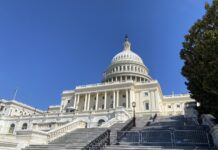
(GA Recorder) — Gov. Brian Kemp says he will sign an executive order as soon as Friday preventing state agencies and public schools from requiring masks.
“Georgians know what to do now,” he said during a Fox News interview Wednesday. “They know how to protect themselves, they know the vaccine is available, they know they can get it, they need to get educated and make the best decision for them and their families and certainly for their children. We don’t need the government mandating what someone’s child can do.”
Kemp plans to sign the order Friday, and it will go into effect at the end of the month, according to the governor’s office.
Kemp has been opposed to school mask mandates throughout the pandemic, saying the decision to require masks was best left up to local school districts.
But Kemp’s authority to do as he plans is not clear, said Anthony Michael Kreis, a constitutional law professor at Georgia State University.
“Georgia law has generally recognized that local school boards are the primary decision-making bodies for policies that deal with local schools and their students, so I’m skeptical of the idea that there’s either a statutory authority or inherent constitutional power for the governor to interpose himself into local governing bodies and just override their preferred policy,” he said.
Kemp framed his decision as another step toward restoring Georgia’s economy.
“The time for mandates is over,” he said. “Our numbers have plummeted, hospitalizations, percent positive cases, we’ve got to continue to reopen the economy, including international travel, and it’s unfortunate that there are some that continue to scare people and not want to do that when we know how to defeat this virus.”
Masks have been a major part of the culture wars since the pandemic began, and Kemp’s decision is likely also aimed in part at pleasing a chunk of the Republican base that has been unhappy with what they see as overly burdensome restrictions.
On Monday, Kemp signed an executive order banning state agencies from requiring so-called vaccine passports, or proof of vaccination.
The rollout of the latest COVID-19 public health order comes as districts across the state have ended or are preparing to end the school year. Many districts already had mask-optional policies, and many of those that mandated masks have already announced plans to drop the requirements in the fall.
A group of Cobb County parents announced Wednesday they would end a lawsuit over that district’s mask policy after administrators said they are planning to relax a mask mandate in the next school year, according to East Cobb News.
Barbara Skok, a Columbus mother of four and founder of a group called Moms Against Mandatory Masking, said she was glad at the news, but she’ll be happier when Kemp signs the order.
“We’re very excited to see such a thing, but we’ll believe it when we see it,” she said. “Decisions are made at the local level around here, and people are much more in their feelings here than they are in Atlanta, so we will believe it when we see it. But we’re very happy. We’re very encouraged. We are sending emails to the governor right now, saying please sign it.”
With vaccines now available to people 12 and older and the Centers for Disease Control and Prevention saying it is safe for vaccinated people to congregate in most indoor settings, masks should only be worn by someone who wants to, Skok said.
The plan was less of a hit with health professionals, who worry it could work against efforts to slow the spread of the pandemic.
Dr. Isaac Chun-Hai Fung, associate professor of epidemiology at the Jiann-Ping Hsu College of Public Health at Georgia Southern University, said he is still concerned by the state’s relatively low vaccination rate and the fact that children under 12 likely will not be eligible by the time the school year starts.
Georgia ranks at No. 44 among states for the share of people who have gotten at least one dose of COVID-19 vaccine with 39%, compared to a national average of 50%, according to CDC data.
The odds of healthy children under 12 dying or becoming severely ill from COVID-19 is low, Fung said, but maskless students could spread the disease to unvaccinated teachers and other members of the community.
“Those teachers and staff members who are currently unvaccinated, they are at risk,” he said. “I can see reasons why individuals complain having a face mask makes the education process more challenging, but that is why it may be even more important to encourage older teachers and other staff members in schools of all levels to be vaccinated.”
Fung said he wants to see Kemp step up efforts to encourage Georgians to be vaccinated, and he is hoping plenty of teens and teachers will be lining up to get the shot over their summer vacation.
“I don’t think we will reach herd immunity by the time schools open in August, but at least it would be at least some form of indirect protection for those individuals who are not vaccinated,” he said.







